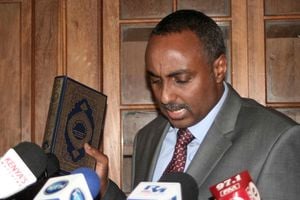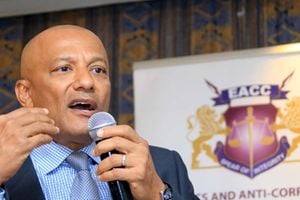
Ethics and Anti-Corruption Commission Chairman Bishop David Oginde at Integrity Centre in Nairobi on March 27, 2024.
National Assembly Speaker Moses Wetang'ula has saved the job of Ethics and Anti-Corruption Commission chairman David Oginde.
Mr Wetang'ula blocked an amendment to a Bill that would have removed him from office once it became law.
However, the ultimate test of Mr Oginde's survival remains with President William Ruto should he decline to sign the Bill and return it to the House with a memorandum recommending reinstatement of the changes that would see Mr Oginde leave immediately after the Bill becomes law.
Mr Wetang’ula cited constitutional issues as reasons for his refusal to approve proposed amendments to the Ethics and Anti-Corruption (Amendment) Bill 2024 by the Justice and Legal Affairs Committee (JLAC) chaired by Tharaka MP George Murugara.
MPs Caroli Omondi (Suba South) and Shakeel Shabbir (Kisumu East) had also proposed similar amendments as Mr Murugara- to delete clause three of the Bill.
However, Speaker Wetang’ula warned that the proposed changes, if allowed to stand and approved by the House, would have offended Article 250 of the Constitution as it would have immediately applied to the current EACC chairperson.
“I have declined to approve the proposed amendments,” Speaker Wetang’ula ruled, in a communication to the House on the implications of deleting clause three of the Bill.
“The Speaker is obligated to ensure that a Bill under consideration by the House is insulated from any amendment or revision that may place it at odds with either a constitutional or statutory provision or violate the procedural prescriptions of the Standing Orders,” Mr Wetang’ula told the House.
He noted that as a Speaker of the House, he cannot preside over deliberations that may lead to “unconstitutional or absurd results.”
“The question of the constitutionality of a matter under consideration by the House should not be put to a vote,” he directed.
The Bill was sponsored by House Leader of Majority Kimani Ichung’wah (Kikuyu) and his former minority counterpart Opiyo Wandayi, then Ugunja MP before he was appointed to the Cabinet.
Qualifications
The Bill is sponsored to actualise the report of the National Dialogue Committee (Nadco) that was adopted by Parliament in February 2024.
The Bill sought to limit the qualification of the commission’s chairperson to a person qualified to be a judge of the High Court in proposed changes to section 5 (1) of the EACC Act.
The proposed amendment, in compliance with the Constitution, went on to save the legitimate expectations of the current office holder “where the change in qualification for the appointment shall not apply to the chairperson appointed before the commencement of the Act.”
According to Speaker Wetang’ula, “this is in keeping with the practice of this House when reviewing the provisions relating to the qualifications or terms of persons appointed to public office.”
However, JLAC upon consideration of the Bill, proposed the deletion of clause three so that its application takes effect immediately after it becomes law, in a report to the House.
“There is a need to ensure that after the commencement of the Act, the commission benefits immediately from a chairperson, who is a person qualified to be a judge of the High Court,” Mr Murugara’s proposal read. Both Mr Murugara and Mr Omondi are lawyers.
Mr Wetang’ula, however, warned the trio that their proposed deletion of clause three “flies directly in the face of the provisions of Article 250 of the Constitution on the composition, appointment and terms of office of members of a commission or holder of independent offices.”
Article 250 (3) of the Constitution provides that for a person to be appointed as a member of a commission or the holder of an independent office, such a person “must have specific qualifications required by this constitution or national legislation.”
“This House approved the appointment of EACC chairperson based on the specific qualification required by the constitution and EACC Act.”
“It would, therefore, patently offend the Constitution for the House to contemplate amending the qualifications midstream and to subject a current office holder to new qualifications without providing an appropriate saving provision,” ruled Speaker Wetang’ula.
The former Christ is the Answer Ministries (Citam) Bishop was nominated by the President on March 11, 2023 on the recommendations of the Public Service Commission (PSC), beating about 50 other hopefuls.
Currently, the term of service of the EACC chairperson is on a part-time basis with functions related to strategy and policy “not operational in nature to warrant a legal mind.”
Bishop Oginde, 64, formerly the presiding Bishop of Citam, was appointed on May 2, 2023, by President William Ruto to be the EACC chairperson for a fixed term of six years following the retirement of Archbishop Eliud Wabukala.
The Anti-graft agency CEO Mr Twalib Mbarak, in his submission to Parliament, opposed the law requirement for the commission chairperson, noting that if allowed to stand, would limit the leadership of the commission.
“The commission having carefully considered the proposed amendment, opposes the Bill,” says Mr Mbarak in a submission to the House adding; “based on our experience, there is no added advantage of having a lawyer over the other professions.”
Mr Mbarak noted that the proposed law does not make sense, considering that the commission has a fully-fledged legal services directorate with some of its officers holding qualifications of a judge of a superior court.
The functions of the legal directorate include reviewing evidence in the course of investigation to ascertain it meets the legal threshold and advising the commission on any legal issue before it.
The EACC Act lists a law degree from a university recognised in Kenya as one of the professions from which a chairperson may be appointed.
Previously, the EACC chairperson has been occupied by various professionals including a lawyer qualified to hold office of a judge of the High Court.
For instance, Mr Mumo Matemu, a lawyer, has previously chaired the commission.
Currently, the commission is chaired by Mr Oginde, an architect and a retired Bishop, who succeeded Archbishop (Rtd) Wabukala.
Previously, under the old constitution, Mr Arron Ringera was the director of the anti-graft body assisted by Dr Smokin Wanjala, the current Supreme Court judge among others.
When Justice (Rtd) Ringera left, he was succeeded by Dr Patrick Lumumba, a law scholar.
At the time, the state agency was called the Kenya Anti-Corruption Commission (KACC).
It was overseen by an advisory board that would later oversee its transition from KACC to EACC following a review of the law.
The advisory board was chaired by city lawyer Ahmednassir Abdullahi for five years from 2003 with Ms Fatuma Sichale, the current judge of the Court of Appeal, as his vice-chairperson.
In 2009 city lawyer Okong’o Omogeni, the current Nyamira Senator took over from Mr Abdullahi and was succeeded by Dr Tom Ojienda, a professor of law who is the current Kisumu Senator.










